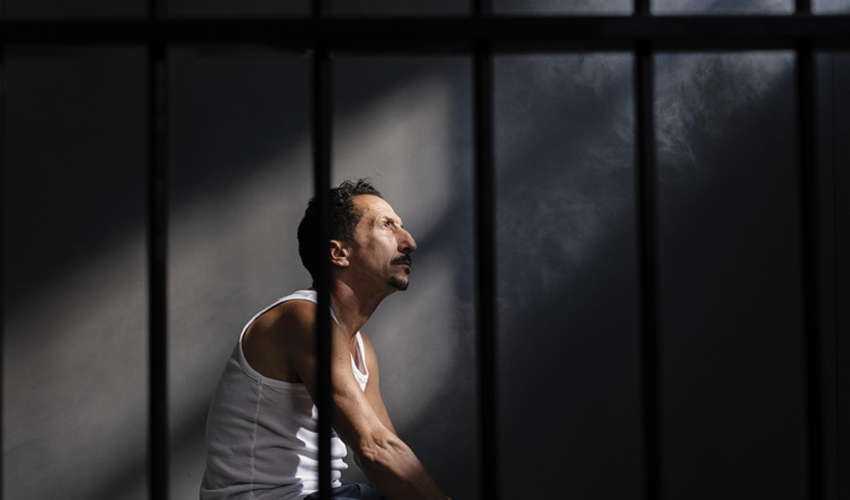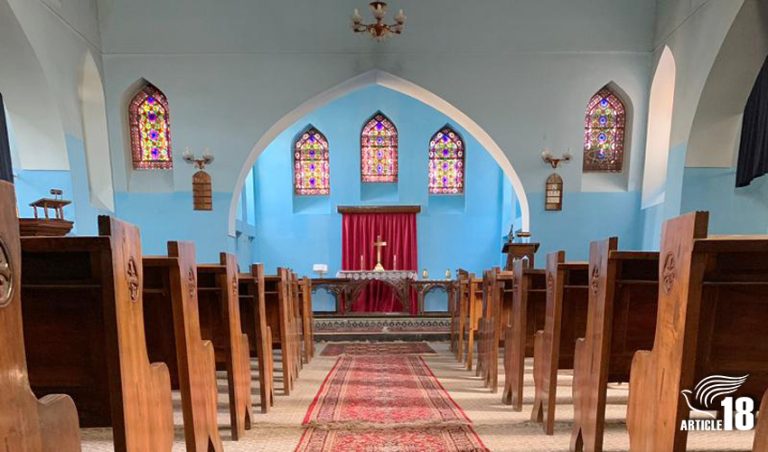This article was written by the former pastor of an official church in Iran, who spent weeks in Tehran’s Evin Prison following his arrest by agents of Iran’s Ministry of Intelligence for his church activities, and endured severe pressure from his interrogators including prolonged solitary confinement. The pastor, who does not wish to be named, now continues his Christian activities abroad, and has been active for many years in both pastoral ministry and the training of other Christian leaders.

Christians in Iran are in constant danger of arrest, often followed by interrogation and imprisonment, so being prepared for these eventualities is essential.
However, many Iranian Christians not only do not have the necessary training in this regard; they even consider the possibility far-fetched – and this lack of preparedness includes even pastors and others actively involved in the life of the Church.
It is important to realise that an awareness of the dangers can significantly reduce the damage resulting from the experiences of arrest, interrogation and imprisonment.
Research into this topic has tended to focus more on helping people to recover after spending time in prison, rather than preparing them in advance. In this article, I propose three factors – psychological, spiritual and organisational – that may help to prevent arrest, or at least reduce the severity of the trauma caused if it does occur.
Psychological readiness
1. Mental and emotional health
Different people respond to imprisonment in different ways, depending on their emotional and psychological health, and their personality types.
For example, a person who has suffered from depression, anxiety or post-traumatic stress disorder (PTSD) in the past, when arrested and then subjected to interrogation and imprisonment, can find that these symptoms return.
For this reason, people who have a history of such conditions should prepare themselves by seeking to address these problems through medical help and prayer.
It is also recommended that people who have a history of such conditions refrain from accepting important church responsibilities, to reduce the likelihood of their arrest and also to decrease the potential fallout should they be arrested.
In addition to the above, people who have grown up in families affected by issues such as divorce, addiction, or crime may also be more prone to suffering from insecurities that could resurface during the immense stress of interrogation and imprisonment.
These two groups could be considered to be especially vulnerable to the pressures of prison, potentially resulting in psychological collapses and greater susceptibility to divulging sensitive information about themselves and others during interrogation.
2. Lack of maturity
In addition to the above factors, individuals may not have sufficient emotional or intellectual maturity, perhaps due to a lack of education, or other environmental factors.
This could reveal itself in an inability to control emotions or make the right decisions under pressure, as well as in poor self-esteem or a lack of self-awareness.
It is inappropriate for such individuals to take on important roles within a secret house-church, as under interrogation they would likely be unable to cope with the pressure and may reveal sensitive information about themselves or others.
Churches must also be aware that such individuals may offer themselves for high-profile roles in order to compensate for their lack of self-esteem; churches should guard against appointing such individuals, as it could have a detrimental impact upon the whole group if the weaker members break during interrogations.
Therefore, every member should be aware of his or her strengths and weaknesses, and realise whether or not it is appropriate for them to take on a leadership position, with all the extra responsibilities that entails.
Spiritual readiness
1. Spiritual growth
The spiritual growth of an individual is an important factor in assessing their vulnerability during the process of arrest, interrogation and imprisonment.
For example, new Christians who have quickly taken on important responsibilities are likely to be more vulnerable under interrogation, which may include long periods in solitary confinement in an attempt to force a leak of information.
If the person still has trouble with the basic principles of their Christian faith, or a lack of intimacy with God, they may be crushed by these pressures and even suffer a serious crisis of faith.
On the other hand, experienced Christians who have grown spiritually and are not prone to depression or anxiety may find the prison experience an opportunity for further growth, during which time their devotion to God is even enhanced.
Unfortunately, due to a lack of experienced leaders in many house-churches, members who have not yet achieved the necessary spiritual growth will often end up in leadership roles, endangering themselves and others.
2. Unresolved spiritual issues
Individuals with unresolved issues in their spiritual lives may also find that these are exacerbated during arrest and detention and may find it harder to withstand the pressures of interrogation.
In many cases, when security agents find that there is a particular ethical problem in a person’s life, they will use it as leverage in applying pressure.
In this regard, interrogators have a dual aim: firstly to discover things about the church group, and secondly to see the individual abandon their faith.
Therefore, a person being caught in a pattern of sin is not just a personal matter for them to resolve with God; it may also have a bearing on the security of the Church at large, with the potential to cause irreparable damage.
Spending time in prison means engaging in serious spiritual warfare. For many, this becomes an opportunity for deep repentance and positive personality development, but a person caught in a pattern of sin is more vulnerable to experiencing a crisis of faith.
3. Theology of persecution
It is also important to consider a person’s theology of suffering and persecution within the Christian life. Do church members know that suffering is part and parcel of being a Christian? Have they discussed these issues in their church? Or do they consider arrest and imprisonment an honour for other Christians, but not for themselves?
It is imperative that church members, especially leaders, continually learn about concepts such as suffering and persecution, and understand that these are unavoidable parts of being disciples of Christ.
They should look at what the Bible says about persecution, at instances of persecution in the history of the global Church, and also familiarise themselves with the story of the Church in Iran and its heroes of faith.
This is all part of the process of preparing Christians to face the possibility of arrest and detention.
Some of the following books may also be useful for those who wish to find out more in this regard:
- “In the Shadow of the Cross: A Biblical Theology of Persecution & Discipleship” by Glenn Penner
- “Faith That Endures: The Essential Guide to the Persecuted Church” by Ronald Boyd-MacMillan
- “Through Many Tribulations: The Theology of Persecution in Luke-Acts” by Scott Cunningham
- “The Call to Joy and Pain: Embracing Suffering in Your Ministry” by Ajith Fernando
- “The Cost of Discipleship” by Dietrich Bonhoeffer
- “In God’s Underground” by Richard Wurmbrand
In sum, even though some may be cowed by this call to suffering, and leave the Church, it is the duty of the Church to give its members correct Biblical teaching, which is that they must be prepared to face suffering at any moment.
The experience of the Church in Iran and around the world indicates that Christians who are prepared to face suffering are better able to tackle it when it arises.
If prepared, a Christian can see the experience of imprisonment not as a catastrophe, or bad luck, but as an honour given to them as a disciple of Christ, and a testament to the authenticity of their faith and their loyalty to God.
Organisational readiness
The final essential area to consider is a church’s structure and practices.
Many house-church networks have structural problems that make them susceptible to collapse in the case of the slightest incident or first arrest of a member.
Many of these churches, and the networks they belong to, do not observe the most basic principles of security and protection, and lack organisational integrity.
Although house-churches do not carry out any political or subversive activities, this is how they are viewed by the Iranian regime, so this means that it is essential for them to act with discretion – in order to survive.
These churches must therefore consider the following things to properly prepare themselves for arrest:
- How to react if a church member is arrested: what is the first step to take? And what are the next steps?
- What to do if the leader is arrested: is there a deputy who can take their place?
- Do the members of each church know the members and leaders of other churches? If so, is this necessary, or does it jeopardise the safety of those other churches and risk a collapse of the entire network?
- What kinds of literature do church members possess that could, rightly or wrongly, be considered a criminal offence? Do all church members know where these books and pamphlets are kept and, if so, could this increase their likelihood of confiscation?
- Do church members keep their activities secret? If not, they may increase the risk of discovery and arrest.
- If a member is arrested, what plans are in place to support the person’s family, and what arrangements have been made to help and support the individual upon their release? The released person could well be in need of both medical care and financial support, but in many cases released prisoners are actively avoided by other church members for fear that they too will be arrested. Is it possible to assure members and leaders before their arrest that they will receive all necessary help through through safe channels?
Conclusion
The experiences of Christians who have faced arrest, lengthy interrogation and imprisonment indicate that their vulnerability and the severity of their trauma depends on a number of factors. In this article, I have suggested that it is essential to assess a person’s psychological and spiritual health, as well as the church’s structure and practices, to best prepare for arrest.
Individuals and groups that have the required readiness in these areas, and address the issues mentioned in this article, will experience less fallout if they or a church member are arrested, and also be able to recover more quickly once released.
Therefore, paying close attention to each of these areas is a necessity, and pastors and members of house-churches must take the aforementioned steps to ensure they are properly prepared.



0 Comments